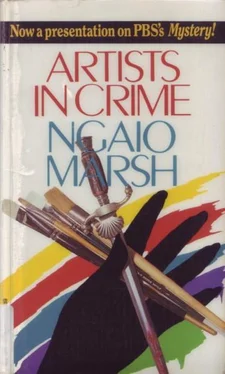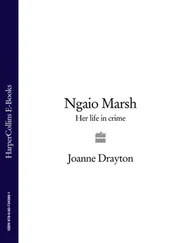Ngaio Marsh - Artists in Crime
Здесь есть возможность читать онлайн «Ngaio Marsh - Artists in Crime» — ознакомительный отрывок электронной книги совершенно бесплатно, а после прочтения отрывка купить полную версию. В некоторых случаях можно слушать аудио, скачать через торрент в формате fb2 и присутствует краткое содержание. Жанр: Классический детектив, на английском языке. Описание произведения, (предисловие) а так же отзывы посетителей доступны на портале библиотеки ЛибКат.
- Название:Artists in Crime
- Автор:
- Жанр:
- Год:неизвестен
- ISBN:нет данных
- Рейтинг книги:3 / 5. Голосов: 1
-
Избранное:Добавить в избранное
- Отзывы:
-
Ваша оценка:
- 60
- 1
- 2
- 3
- 4
- 5
Artists in Crime: краткое содержание, описание и аннотация
Предлагаем к чтению аннотацию, описание, краткое содержание или предисловие (зависит от того, что написал сам автор книги «Artists in Crime»). Если вы не нашли необходимую информацию о книге — напишите в комментариях, мы постараемся отыскать её.
Artists in Crime — читать онлайн ознакомительный отрывок
Ниже представлен текст книги, разбитый по страницам. Система сохранения места последней прочитанной страницы, позволяет с удобством читать онлайн бесплатно книгу «Artists in Crime», без необходимости каждый раз заново искать на чём Вы остановились. Поставьте закладку, и сможете в любой момент перейти на страницу, на которой закончили чтение.
Интервал:
Закладка:
“Did he speak after he had begun to smoke?”
“Oh, yes. A little.”
“What did he say?”
“He said he was happy.”
“Anything else?”
“He said that there was a way out of all one’s difficulties if one only had the courage to take it. That, I think, was all.”
“Did you take your opium and the pipe back to the house?”
“No.”
“Why not?”
“The housemaid had said something about changing the sheets on my bed. I didn’t particularly want to encounter her.”
“Where did you put the things then?”
“In a box under Garcia’s bed.”
“And collected them?”
“This morning before class.”
“Had they been disturbed?”
“I have no idea.”
“Are you sure of that?”
Malmsley moved irritably.
“They were in the box. I simply collected them and took them up to the house.”
“How much opium should there be?”
“I don’t know. I think the jar must be about half full.”
“Do you think Garcia may have smoked again, after you left?”
“Again I have no idea. I should not think so. I haven’t thought of it.”
Alleyn looked curiously at Malmsley.
“I wonder,” he said, “if you realize what you may have done?”
“I am afraid I do not understand.”
“I think you do. Everything you have told me about Mr. Garcia points, almost too startlingly, to one conclusion.”
Malmsley made a sudden and violent gesture of repudiation.
“That is a horrible suggestion,” he said. “I have told you the truth — you have no right to suggest that I have — that I had any other motive, but — but— ”
“I think I appreciate your motives well enough, Mr. Malmsley. For instance, you realised that I should discover the opium in any case if I searched your room. You realised that if Mr. Garcia makes a statement about Friday, he will probably speak of the opium you gave him. You may even have known that a plea of irresponsibility due to the effect of opium might be made in the event of criminal proceedings.”
“Do you mean — if he was tried for murder, that I— I might be implicated? That is monstrous. I refuse to listen to such a suggestion. You must have a very pure mind, Inspector. Only the very pure are capable of such gross conceptions.”
“And only the very foolish attitudinise in the sort of circumstances that have risen round you and what you did on Friday afternoon. Come, Mr. Malmsley, forget your pose for a moment. To my aged perceptions it seems a little as if you were mixing Dorian Grey with one of the second-rate intellectuals of the moment. The result is something that — you must forgive me — does not inspire a policeman with confidence. I tell you quite seriously that you are in a predicament.”
“You suspect Garcia?”
“We suspect everyone and no one at the moment. We note what you have told us and we believe that Garcia was alone in the studio in a semi-drugged condition on Friday evening when we suppose the knife was thrust through the throne. We learn that you drugged him.”
“At his own suggestion,” cried Malmsley.
“Really? Will he agree to that? Or will he say that you persuaded him to smoke opium?”
“He was perfectly ready to do it. He wanted to try. And he only had one pipe. A small amount. He would sleep it off in a few hours. I tell you he was already half asleep when I left.”
“When do you think he would wake?”
“I don’t know. How should I know? The effect varies very much the first time. It is impossible to say. He would be well enough in five hours at all events.”
“Do you think,” said Alleyn very deliberately, “that Garcia set this terrible trap for Sonia Gluck?”
Malmsley was white to the lips.
“I don’t know. I know nothing about it. I thought he must have done it. You have forced me into an intolerable position. If I say I believe he did it — but not because of the opium — I refuse to accept— ”
His voice was shrill, and his lips trembled. He seemed to be near to tears.
“Very well. We shall try to establish your own movements after you left the house. You caught the six o’clock bus?”
Malmsley eagerly gave an account of his week-end. He had attended the private view, had gone on to the Savoy, and to a friend’s flat. They had sat up till three o’clock. He had spent the whole of Saturday with this friend, and with him had gone to a theatre in the evening, and again they had not gone to bed until very late. Alleyn took him through the whole business up to his return on Sunday. Malmsley seemed to be very much shaken.
“Excellent, so far,” said Alleyn. “We shall, of course, verify your statements. I have looked at your illustrations, Mr. Malmsley. They are charming.”
“You shake my pleasure in them,” said Malmsley, rallying a little.
“I particularly liked the picture of the three little men with scythes.”
Malmsley looked sharply at Alleyn but said nothing.
“Have you ever visited Chantilly?” asked Alleyn.
“Never.”
“Then you have not seen Les Très Riches Heures du Duc de Berry ?”
“Never.”
“You have seen reproductions of the illustrations, perhaps?”
“I–I may have.”
Nigel, staring at Malmsley, wondered how he could ever have thought him a pale young man.
“Do you remember a book called The Consolations of a Critic ?”
“I — don’t remember — I— ”
“Do you own a copy of this book?”
“No — I–I— ”
Alleyn picked up the little blue volume from under his chair and laid it on Malmsley’s knee.
“Isn’t this book your property, Mr. Malmsley?”
“I–I refuse to answer. This is intolerable.”
“It has your name on the fly-leaf.”
Nigel suddenly felt desperately sorry for Malmsley. He felt as if he himself had done something shameful. He wished ardently that Alleyn would let Malmsley go. Malmsley had embarked on a sort of explanation. Elaborate phrases faltered into lame protestations. The subconscious memory of beautiful things — all art was imitative — to refuse a model was to confess yourself without imagination. On and on he went, and ended in misery.
“All this,” said Alleyn, not too unkindly, “is quite unnecessary. I am not here to inquire into the ethics of illustrative painting. The rightness or wrongness of what you have done is between yourself, your publisher, and your conscience, if such a thing exists. All I want to know is how this book came into the possession of Sonia Gluck.”
“I don’t know. She was odiously inquisitive — I must have left it somewhere — I had it in the studio one afternoon when I — when I was alone. Someone came in and I–I put it aside. I am not in the least ashamed. I consider I had a perfect right. There are many dissimilarities.”
“That is what she was driving at when she asked you, on the morning of the experiment, where you got your ideas?”
“Yes. I suppose so. Yes.”
“Did you ask her for the book?”
“Yes.”
“And she refused to give it up?”
“It was abominable. It was not that I objected to anybody knowing.”
“Did you go to her room?”
“I had every right when she refused. It was my property.”
“I see. You tried to recover it while she was away. On Friday, perhaps, before you left?”
“If you must know, yes.”
“And you couldn’t find your book?”
“No.”
“Where was this book, Bailey?”
“In a locked suit-case, sir, under deceased’s bed. Someone had tried to pick the lock.”
“Was that you, Mr. Malmsley?”
“I was entirely justified.”
“Was it you?”
“Yes.”
Читать дальшеИнтервал:
Закладка:
Похожие книги на «Artists in Crime»
Представляем Вашему вниманию похожие книги на «Artists in Crime» списком для выбора. Мы отобрали схожую по названию и смыслу литературу в надежде предоставить читателям больше вариантов отыскать новые, интересные, ещё непрочитанные произведения.
Обсуждение, отзывы о книге «Artists in Crime» и просто собственные мнения читателей. Оставьте ваши комментарии, напишите, что Вы думаете о произведении, его смысле или главных героях. Укажите что конкретно понравилось, а что нет, и почему Вы так считаете.







